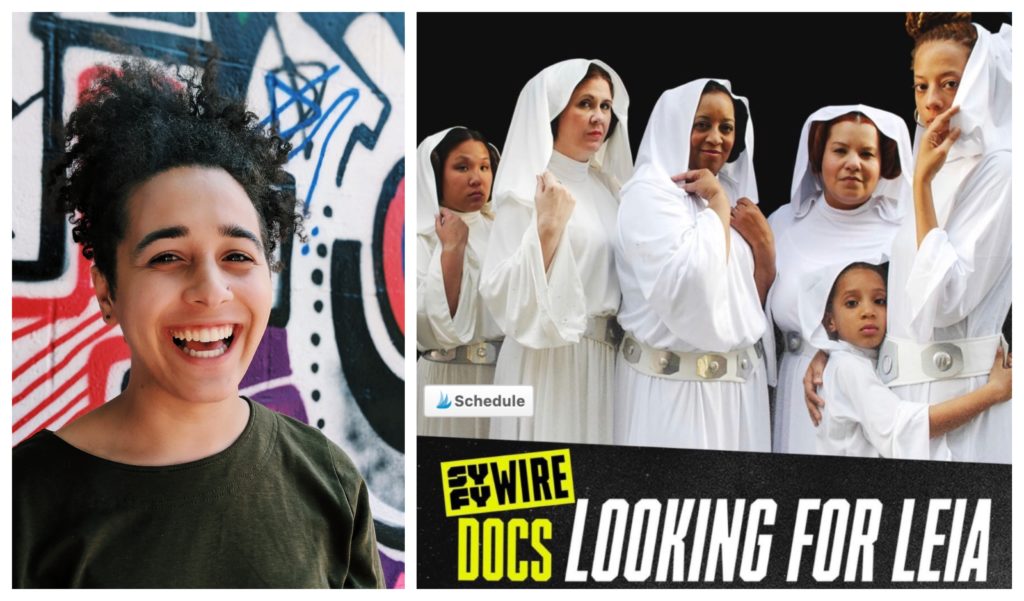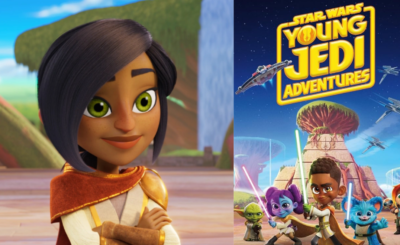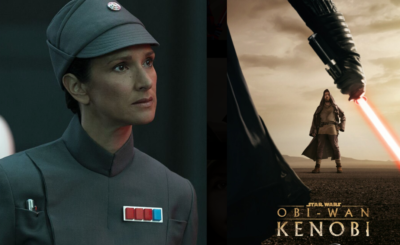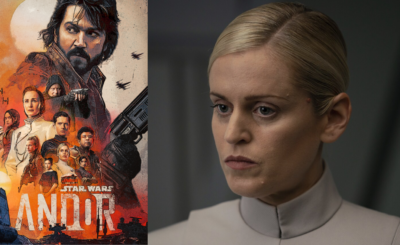
Emilia Quinton was behind the cameras for many of the docuseries Looking for Leia‘s most memorable moments. She answered a few questions for 365 Star Wars Women via email.
What was your introduction to Star Wars?
I watched A New Hope on VHS for the very first time with my father- I don’t really remember how old I was, probably 8 or 9, I just remembered I was enraptured. I burned through the tape eventually but my dad never told me there were more movies in the series. So one day I’m at a friend’s house and I see this box set of the original trilogy and my mind explodes. Our friendship basically became Star Wars centered at that point- I would constantly try to come over to watch the movies, and I remember he was always really wanting to play baseball or something- that friendship didn’t last a very long time.
Do you have favorite films, characters, or Star Wars books? If so what makes them your favorites and have those favorites changed much over time?
Huh, I don’t really have a favorite- I like them all, for different reasons, and I’ll watch them at different times. I’ve rewatched The Force Awakens a lot. Even though I love the original and enjoy parts of episodes 1-3 I never truly saw myself in those stories in a way I didn’t understand until the contemporary trilogy arrived. I connect with Rey and Finn as characters and as action heroes. I deeply enjoy the comics too, and the Vader series was one of my recent favorites.
How did you get connected with Looking for Leia and what did you do for the docuseries?
I don’t have Twitter, but a professor from my college who did saw a call out for camera ops in Seattle for a production called Looking For Leia. I was about a year into trying to freelance and just not going anywhere- I didn’t have a lot of confidence at the time and was just pretty afraid of embracing myself as a filmmaker in general.
I emailed the production and, lo and behold, Annalise got back to me, invited me to come film for her. That experience changed my life. I spent three full days interviewing women in their power, being led and nurtured by an incredible director (and her partner/ our sound person Storm Miguel Florez). I was fully encouraged to do my thing, and my thing was making stuff look pretty on camera. For the next year I flew out or came along for several different stretches of filming on the project as a B camera operator, but that first gig kickstarted me and kickstarted my confidence.
Looking for Leia is about women who love Star Wars and was made almost entirely by women. Was your experience working on LFL different than many of the other productions you have worked on? If so, how?
Was this experience different…yes, yes and YES, HONEY. I can’t even list the number of ways but I’ll try to summarize. For starters, this was the first time I was ever introduced to the concept of colonial film making and then the idea that we could de-colonize our process. The film world is still one of the most cisgender, heterosexual, white patriarchal systems in existence. It’s embedded within the structure of the machine.
With documentaries I’ve seen this manifest in the process of arriving to a space, taking up a lot of room, pressuring people to sign legal releases, getting what you want/need, exiting and essentially leaving your subjects behind. Not all docs work like this but enough do that it’s still an issue. So Annalise actively tries to bring the power back to her subjects. She gives them say in how they’re portrayed, she cares for and connects to her crew and the people we interviewed- truly, the spaces she creates are safe for the people who enter them. I learned so much from her about how film can affect people in production before it even hits the screen.
What are some of the memorable locations and/or interviews you photographed for LFL?
I think one of my all-time favorite days was the Leia day in New York. Annalise set me loose to get beauty shots, so I was operating a gimbal in rush-hour pedestrian traffic in the middle of Manhattan while this parade of multi-generation, multi-ethnic Leias walked down the street. Seeing these people in their power, contrasted by these glorious white costumes against the gray of the city was just- it’s hard to describe. It’s why I make movies.
How did you get interested in working behind the camera and are there female camera operators and cinematographers who you look to for inspiration or women who acted as mentors?
I think I have always been interested in working behind the camera, it just took me a little while to embrace that fully. I had a job as a copywriter back in 2014, but realized while I was at my desk that I was writing scripts for short films in my free time or filming little projects with my roommates. I ended up going back to college for film and in that program just embraced my love for cameras and the film making process.
My inspirations are numerous, and there are so, so many brilliant women and non-binary people working behind the camera that it’s hard to pour that praise into one place. My artistic inspiration goes to Kira Kelly, Reed Morano, and Katelin Arizmendi.
In my personal life, I’d like to shout out Ava Shorr, an LA-based director of photography as both a friend and a mentor, Portland-based DP Sarah Whelden as the same. Annalise Ophelian and Liz Haan are two people who opened my eyes to directing and creating films with the intention of creating compassionate spaces.
You are the first camera operator/cinematographer I have profiled in over 400 posts for 365 Star Wars Women. I’m first curious if you know of any women who have done camera work in a Star Wars production (note from Amy: look for an interview related to this in 2020!) and also how do you think the industry can encourage more women to get behind cameras? What are the roadblocks you have experienced or feel other women have experienced?
To my knowledge I don’t know any women who have operated on any Lucasfilm Star Wars productions (but I could certainly be wrong!). There are moves in the industry towards diversity but they’re glacial once you move up to the tent pole films. For multiple reasons the moves for women to operator and then DP at the tent pole, 80mil+ budget scale are just, just trickling in.
The system right now is punishing. The most important thing studios can do to encourage more women on their crews is to actually encourage more women on their crews. They can do lip service but if they don’t actively work to create a pipeline with the intention of fostering diversity then things stay the same. That means fellowships, union outreach/training, connecting diverse candidates to established people and incentives for productions to engage in diverse hiring through policy and activism. I want to say that these things happen and are happening- but very, very slowly, and certainly slower than the amount of PR being directed towards touting diversity would have you believe.
The roadblocks in front of women on set are innumerable. Your average production demographics will be majority white, majority male and accountability and diversity sensitivity varies from set to set, often sitting at little to none. It is assumed you will be less knowledgeable, less experienced, given less responsibility and ultimately faced with a constant barrage of microaggressions or open aggression and left to deal with that on your own.
Except for when it’s not. Because that’s the thing- leadership sets so much of the tone for every production and sometimes you are surrounded by the most loving, understanding, safe people. The experience of feeling seen and supported and supporting your peers in making industrial level art is a high that is hard to replicate, and it’s what keeps people coming back. More and more often this is the type of experience people will have, but unfortunately the bad experiences are still so numerous that it’s enough to lockout or discourage people, particularly women, looking to get into the business.
If you’ve seen any of the completed LFL episodes (note: this was asked before the series premiered) do you have a favorite one? If not are there any that you are the most excited to see?
I’ve seen the first three episodes and really, I don’t have a favorite. I just love being immersed in these stories- I’m so proud of the work that every single person put into this project and I want to share every minute of it with the whole freaking world.
Can you share any upcoming projects with us?
With pleasure! So I’m actually moving out of camera operating and into directing. I directed a short film recently called Sam’s Town, a queer story about loss, love and friendship and we’re hoping to wrap up post production in January. I’ve also got a short documentary I filmed and produced with director Liz Haan, Our Trails Too, doing a festival run right now. Finally I have a series I’m hoping to develop in 2020- so it’s a very exciting time.
What advice you have for women interested in doing work similar to yours?
I really don’t feel qualified to give advice because I still very much feel like I’m figuring things out. I guess I’d say never stop reminding yourself that you have value. Whatever you think you’re worth, add 30 percent. I’m not talking strictly monetary here either. Take a stand for that value and be picky about who you give your talent too. The end goal is to have a network of people who give you the space to be respected and elevated. There’s a lot of crap in the film world and the only way to stay in the game is to fly with the people who believe in you.
Find more of Emilia’s work on her website.
Watch the entire Looking for Leia series on SYFY.
You can read all of the 365 Days of Star Wars Women posts here.







